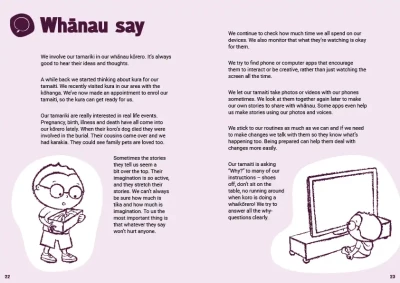
All those screens – managing screen time
Young children love screens – and why wouldn’t they? Most of us do. But how much screen time is too much? Whānau are models for tamariki, so we all need to look at how we use screens and devices, not just how our children are using them.
How much is too much?
‘How much TV should young kids watch?’ has been a sticky question for many years. It’s such a convenient babysitter and kids love it, so what’s the problem?
The key is ‘everything in moderation’.
- The World Health Organisation recommends less than 1 hour per day for 2 to 5-year olds.
- The American Academy of Pediatrics (AAP) has recommended no screen time for children under 2.
- The AAP’s recent policy statement suggests that families develop plans for using devices, with different guidelines for each child depending on their age or stage of development.
The AAP also suggests media- and device free times, like dinner time, when families can give full attention to each other – both kids and adults. Bedtimes should be screen free too, as the blue light from devices can interfere with sleep.
Remember, children need to play with real things and real people in the real world, and they need someone to talk with them, not always at them.
Positive uses of screens
Researchers have found that one big plus for technology is video chatting. When whānau are scattered all around Aotearoa and the world, using the likes of Zoom, FaceTime and Messenger is a great way to regularly keep in contact with each other.
Screen time can also be whānau time. Sharing screen time tamariki builds relationship and attachment. Whānau can try watching videos together, talking about what they’re doing or playing an educational game together.
Who suffers most from device addiction?
The TV, or a digital device, may appear to act as a babysitter, but the communication is all one way. Children’s language and cognitive abilities are not nurtured. Young children need other human beings to engage with them, read or talk to them, to develop those important social and communication skills.
Parents’ own online behaviour can cause problems for their tamariki. If a parent’s attention is frequently fixed on a TV or phone screen, who’s missing out? Tamariki can develop a poor sense of their self-worth now and in the future if they are repeatedly ignored or neglected in favour of digital devices.
The presence of technology in everyday life means that parents are more available to their work too, and work can interrupt precious whānau time.
Parents who are often distracted by devices are providing an unhelpful role model for their tamariki. If we don’t want our children to be glued to devices, we can’t be glued ourselves. Do we want babies building an attachment relationship with their parents or a screen?
Whānau habits
Talk to whānau about how they use screens such as TVs, iPads, phones, computers and video games – both for themselves and their tamariki.
Whānau may be wondering about how much screen time is OK for young children. It’s a good conversation to have. Explore whether whānau have any concerns. You could ask if they have any established screen- or device-free times. This might get whānau talking about the use of screens in their home and what limits they might want to set.
You may wish to discuss with whānau that sometimes children play up when their parents are on the phone a lot. Could it be for attention? How might you feel if the person you love most in the world is often on their phone?
Conversation ideas
Learn more
Tots, toddlers and TV: The potential harm
Brainwave Trust
Article that explores the effects of TV watching by young children.
Guidelines on physical activity, sedentary behaviour and sleep for children under 5 years of age (PDF, 1.5 MB)
World Health Organisation
WHO guidelines and recommendations to increase physical activity, reduce sedentary time and improve time spent sleeping for young children.
Helpful resources for whānau
-
Screen time advice for parents
Netsafe
Netsafe advice to help you work out what’s right for your family.
-
Screen time and young children
Caring for kids
Children under 5 years old are exposed to more screens than ever before. This article has information from Canadian paediatricians about screen time for kids.











